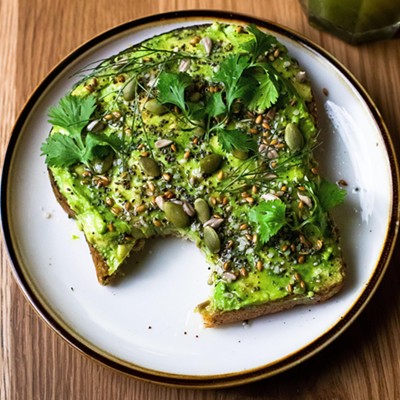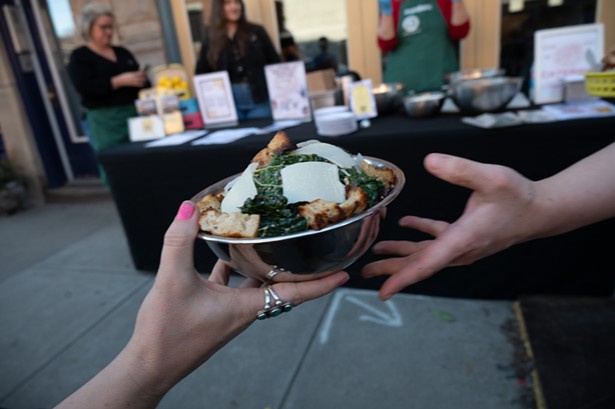Hours: Mon.-Thu. 11:30 a.m.-10 p.m.; Fri.-Sat. 11:30 a.m.-10:30 p.m.
Prices: Starters $2-9; sushi platters $15-35; Korean entrées, $9-30
Fare: Korean BBQ and hot pots, sushi, Japanese hibachi
Atmosphere: Asian oasis
Liquor: Full bar
Smoking: Permitted throughout
Angelique has a fear of windowless restaurants. Sometimes it's a suspicion that whatever's going on inside is truly better left unseen. Other times, it's an aversion to going out to eat by fluorescent light.
The bunker-like brick edifice of Young Bin Kwan, a Korean stitch on the seam between Bloomfield and Lawrenceville, reveals little about what's inside, except for the banner announcing it's under new management. Walking in for the first time, we had no idea what to expect and were beyond pleasantly surprised. A bridge over a koi pool leads to a spacious, lamp-lit dining room decorated in the Japanese temple style, highlighted by handsome pavilions over the bar and sushi counter. Water splashes gently down a rock fountain in the background, and the sliding shoji screens separating private-party rooms from the main floor are the real thing.
The restaurant's subtitle is Tokyo Japanese Steak House, and some of its tables are set up with hibachi grills for those who like performance with their steak and seafood. But the menu offers a choice of cuisines, from sushi and "Korean-style Chinese" dishes to traditional Korean barbecue, bi bim bap and kimchi, and more exotic hot pots, with ingredients such as tripe and intestines. On the Japanese side, there is also a small selection of cooked dishes. But for an appetizer, we were content to sample the efforts of the sushi chef, who matched nicely sized lumps of sweet rice with fish of varying quality: The salmon was silken, but the hamachi was stringy.
Ready for the main course, we watched our server switch out the center of our table for a metal grill, under which she lit a gas flame. As the grill heated up, she filled our table with an array of small bowls full of sweet and sour vegetables, many of them pickled, to accompany our beef bulgogi and "Korean bacon." Bulgogi describes the classic flavor of Korean barbecue, a sweet marinade not unlike some American barbecue sauces, but subtler and more integral as the sauce is absorbed into the meat instead slathered on top. As the paper-thin slices of beef sizzled on the grill, we plucked off pieces to eat in combination with the side dishes, whose sharp crunchiness contrasted with the meat's tender smokiness. Of the sides, we thought the kimchi was especially good, with a heat that respected other flavors instead of incinerating them.
Smokiness was curiously absent from the Korean bacon, which turned out to be uncured pork belly. It looked similar to American bacon, but the unsmoked flavor was a bit bland, and it didn't crisp or render its fat the same way. Our server showed us how to help it along by basting it with a salty-sweet oil, and then eating the bacon in a lettuce leaf with some savory bean paste. These accompaniments added welcome seasoning and texture, but here was a rare form of pork that failed to impress Jason.
Angelique was quite impressed by her ahgu mae woon tang, a hot pot dish of monkfish, tofu and vegetables in a spicy broth. Not for nothing is monkfish known as "poor man's lobster"; the chunks of fish were firm and succulent with a rich flavor, but riddled with bones, making enjoying them a prickly process. But enjoy them she did, and then drank the piquant, savory broth to the last drop.
If readers should not judge books by their covers, then Young Bin Kwan proves that diners likewise should not judge restaurants by their facades. Behind Young Bin Kwan's humble frontage lies a jewel box of authentic Korean and Japanese cuisine.
Jason: 2.5 stars Angelique: 3 stars










